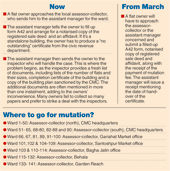 |
The Calcutta Municipal Corporation has decided to introduce one-visit mutation for all properties in the city from March, striking at the root of an inspector raj which allegedly rakes in around Rs 20 crore a year as bribe or “speed money”.
The new system has brought down the number of documents required from at least 10 to three — the filled-up application form, a notarised copy of the registered sale deed and an affidavit.
The sheer number of documents in the current scheme, continuing for more than 50 years, leaves property owners at the mercy of corrupt inspectors who make them go round in circles unless paid a handsome bribe.
The papers that have been left out of the new list include the completion certificate of the building, a copy of the sanctioned building plan and (in case of a housing estate) a list of names of the owners of all flats and the size of each unit.
“Mutation has been a nightmare for Calcuttans for almost half a century,” said Debabrata Majumder, the new mayoral council member in charge of tax assessment and collection. “It has been a longstanding demand of the citizens to simplify the process. After several rounds of meetings with officials, we have decided to launch the one-visit mutation from March 1.”
Majumder took over the responsibility of assessment and collection after the department was taken away from mayor Sovan Chatterjee following Mamata Banerjee’s orders.
In the new system, an applicant will have to visit the CMC office only once at the time of submitting the filled-up application form (A42), a notarised copy of the sale deed and an affidavit.
“The A42 form can be downloaded online or collected from the CMC offices. In the affidavit the owner will declare that the onus of a false statement lies on him and he will pay the proportionate share of dues, if any,” said Majumder.
For example, if the dues from an estate of 10 flats of equal size is Rs 2 lakh, each flat owner will have to pay Rs 20,000. The amount will vary according to the size of the flats.
After checking the documents, the assessment official will give a date for the delivery of mutation certificate. If the applicant cannot collect the certificate in person, it will be sent to him by post.
Civic officials said they would ideally want the mutation to be done in a day but for now they have set a target of seven days. The citizens’ charter, prepared by the CMC following a condition imposed by the British department for international development for a capacity-building grant of Rs 240 crore, stipulates seven days for mutation.
Now, it takes between a month and five years, allegedly depending on the bribe paid.
“We hope the new system will minimise the harassment an applicant has to face in the hands of corrupt assessment inspectors and their touts in the civic headquarters and the other CMC offices,” said a senior revenue official of the civic body.
A job in the assessment department is regarded a plum posting. “The inspectors are allowed to get away with whatever they do as their superiors, too, get a share of the bribe,” said a former official of the department.
Sometimes, touts sent by the inspectors knock on the door of the harassed applicants and bargain for “speed money” with the promise to hand over the certificate in a week. The minimum the touts settle for is Rs 10,000, said a CMC source.
Mutation in one’s name in the CMC assessment record gives the person title right to the property if it is anywhere in wards 1 to 75, the original jurisdiction of Calcutta High Court.
For properties in wards 76 to 141, an additional mutation in the block land and land reforms office will give the owner the title right. But property owners in all 141 wards need the CMC mutation to sell, mortgage, lease out or transfer property by will.










